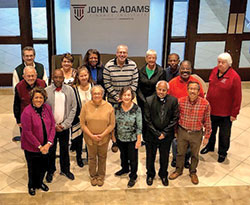New initiative aims to ‘LEAD’ parishes into the future

Pictured are parish leaders that took part in the archdiocese’s LEAD program. The group includes St. Joseph Sister Gail Trippett, parish life coordinator at Holy Angels and St. Rita parishes, both in Indianapolis, and team members of her parishes; Father Francis Joseph Kalapuracka, pastor of St. Thomas More Parish in Mooresville and St. Ann Parish in Indianapolis, and team members of his parishes; Father Jeffrey Godecker, clergy educator; and Dr. Matt Chodkowski and Dr. Terry Schindler, both members of the Univerity of Indianapolis faculty. (Submitted photo)
By Jennifer Lindberg (Special to The Criterion)
Leadership like this doesn’t come along every day.
“This really helps parish leaders in a totally new way,” said Father Jeffrey Godecker, who is helping pilot a new leadership program in the archdiocese called LEAD.
“I’ve been around a lot in my 50 years [of being a priest] and it’s really just about the best I’ve seen,” said Father Godecker, who serves as the program’s clergy educator. “It really engages the participants in a very thoughtful way. It’s not going to replace the priest. The priest still has the bottom line, but in an age where there are fewer of us, we need better collaboration and a way to do it that enables everybody.”
LEAD, an acronym for Leader Education and Development, is a unique guided learning process that helps pastors, parish life coordinators, parish staff and parish volunteer leaders learn a new type of leadership. Described as a “journey of discovery,” the program focuses on a leader’s deep underlying assumptions about leadership, beliefs, motives and the thoughts that drive their behavior.
Underwritten in full by a grant from Lilly Endowment, Inc., the program at the University of Indianapolis is meant to coach leaders throughout the process as they implement it at their unique parish community. The program assists the parish priest in the evangelization process at the parish level to have better leadership skills so the priest can focus on the spiritual needs of a parish.
Today, many priests serve more than one parish community. In 1970, there were 59,192 priests compared to 36,580 in 2018, according to statistics from CARA (Center for Applied Research in the Apostolate).
“Sometimes, leadership is always focused on the leader,” said Father Godecker. “If that leader is charismatic, they usually say, ‘Well, let him do it all,’ but that’s not a healthy way to form community. There is another piece of this. The archbishop [Charles C. Thompson] says we need to give parishioners what is actually theirs.”
The LEAD program is about helping Catholics in the new evangelization. St. John Paul II said this requires “a new fervor, new methods and new expression for announcing and witnessing the Gospel.”
LEAD is a new evangelization method, said Dr. Matthew Hayes, the LEAD project director for the archdiocese.
“Evangelization is a process,” Hayes said. “We are all leaders in that, whether ordained, professed, parish staff or parishioners. We are leaders in the processes, and the task is to ask, ‘How can I use God’s grace, gifts and skills I’ve been given to spread the Gospel?’ ”
Hayes said it is not just the priest or parish staff’s responsibility to lead.
“It’s all of us, “he said. “We need to think through the Catholic parish in the context of lay shared leadership.”
What makes the program unique is that it uses a business model of leadership that is put into the context of the Catholic Church, respecting its values and protocols, but giving the community better leadership tools to survive in the time the Church finds herself, Hayes said.
“It spreads leadership beyond the pastor or the parish life coordinator,” said Hayes. “When we look at the demographics of priests, unless we figure out a way to share leadership beyond one individual we are in trouble.”
LEAD seeks to help the priest be the pastoral leader that he was ordained to be. Many priests are suddenly placed in a manager role at the parish. LEAD is about “having a better sense of awareness of leadership, better managers, and better collaborators,” Hayes said.
John “Jack” Dolan, a member of St. Thomas More Parish in Mooresville, said the program was worth his time and changed his views of the old school way of leadership where one person directs instead of the collaborative way presented.
“People want to be heard, and this new way of leadership will ensure that the best ideas and courses of action rise to the top,” Dolan said.
It also will help parishes sustain themselves and get volunteers at the parish level involved in the decision-making process as “opposed to just filing a seat on a council,” he said.
Holy Angels and St. Rita parishes, both in Indianapolis, also went through the initial training for LEAD. Neither of the parishes has implemented the training yet as it is continuing, and participants are now involved in coaching calls with the program developers through the next three months.
These coaching calls take participants through their strengths and weaknesses of leadership, the cultural attitudes they and their parish have about leadership, and the new understandings of self-assessment and self-awareness they have been able to uncover using the journaling methods of the LEAD program.
Spots are still open for pastors and parishes to take part in LEAD. All costs of the program are covered by the Lilly grant, alleviating any financial strain a parish might have. Those interested in learning more and applying for the leadership program can contact Father Eric Johnson, archdiocesan vicar for clergy, religious life and parish life coordinators, at 317-236-1495.
(Jennifer Lindberg is a freelance writer and a member of St. Joseph Parish in Shelbyville.) †
